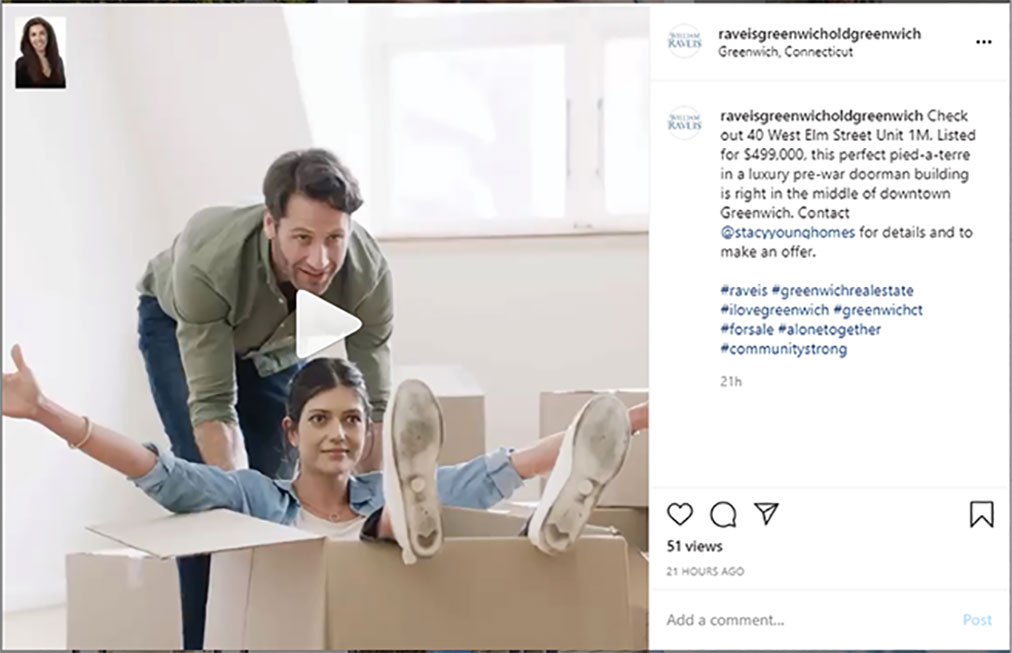Some things in life remain constant, even in these unusual times ”“ including people buying, selling and renting places to live.
The acts of appraising, staging and inspecting properties are pretty much the same, but someone looking to tour their potential new home is facing new challenges.
Open houses are out, thanks to government-mandated limits to how many people can gather in one spot, and the fear on both sides of a transaction of spreading COVID-19 cannot be overestimated.
But, as with so many things these days, technology is coming to the rescue, according to agents at William Raveis Real Estate (WRRE), one of the largest family-owned Realtors in the Northeast.

Screenshot of a virtual tour of 40 West Elm St. in Greenwich.
The Shelton-based firm, which also has a major presence in Florida, announced a record $12 billion in sales for 2019, up from $11.3 billion in 2018, and was experiencing “an exceptional first quarter, until all this started,” said Beverly Walsh, vice president of sales and manager of WRRE”™s Westport office.
“All this,” of course, is the pandemic, which Walsh said has caused business to go down significantly.
“It all happened so quickly,” she said. “We suddenly had sellers saying, ”˜Don”™t sell my house ”“ I don”™t want someone who might be infected coming here.”™ And the same thing with buyers ”“ ”˜I don”™t want to go in some stranger”™s house, I”™m hunkering down”™.”
But while showing listings virtually via FaceTime, Zoom or through social media channels has been on the rise for some time, today the virtual tour has become practically a must, according to David Wilk, sales manager at WRRE”™s Greenwich office.
“There was a concentration of agents doing that before, but we”™ve seen a huge increase in usage. And it crosses all age groups and levels of experience. Some of them are learning on the job and getting better as they go along. And some of them,” he allowed with a chuckle, “are utilizing their children to put together and edit the videos.”
The virtual tour features the agent walking through the house and pointing out its particulars; demonstrating water pressure by turning on faucets; showing off the natural light in certain rooms, and so on. The prospective buyer can ask questions, “and really get down to the nitty-gritty,” Walsh said.
In some cases, the seller will conduct the tour, but it”™s one or the other, very rarely both, she added.
Recent Westport office transactions have included:
- The present tenants of a rental home doing a walk-through and explanation of the home using their iPhone, while the agent and prospective tenant waited outside the property. The home rented at full price and a one-year lease was signed immediately.
- A prospective renter stayed in his home, asked questions, and fully viewed the property on FaceTime, made a full price offer, signed a lease immediately and moved in four days after the showing.
- Prior to a FaceTime showing of a Greenwich home, an agent sent the prospective buyers the floor plan and numbered the pattern she would be following, so they knew where she was in the house. Upon completion of each of the house”™s three floors, she summarized to see if she needed to revisit any rooms before going to the next floor. The same was done outside, including pool, house mechanicals, and conditions of the landscaping and driveway. The clients made an offer sight unseen.
Video of surrounding houses, streets and the like can also be taken. The one risk comes in the form of unexpected odors or other problems not easily detected on a screen, Walsh said: “The contract clearly states that they are purchasing it sight unseen. But we want them to see any flaws. Nobody wants an unhappy client.”
The days of undecided clients informally browsing several properties are also temporarily over, Walsh said. “It”™s not in anyone”™s best interest just to go around seeing houses,” she said.
Wilk said that live “open houses” via apps like Zoom have become popular, with the agent or owner providing tours and answers to multiple potential buyers or renters.
The process of moving in and out has remained pretty much the same, he added, though there are more gloves and face masks in evidence these days.
“The only problem I know of is when someone who was living in Westchester County was ready to move into a rental in Greenwich,” Wilk recalled. “And they couldn”™t get a mover, because that was not deemed an essential business by the governor (Andrew Cuomo) at the time. But then he changed it, and everything went forward.”
Both agents said they believe the new technological reality will remain in place once the pandemic passes.
“It”™s become a vital part of selling houses,” Wilk said, “and even once we”™re back to ”˜normal,”™ I think it will continue to be a part of our everyday job.”





















